Fleurs du Mal Magazine


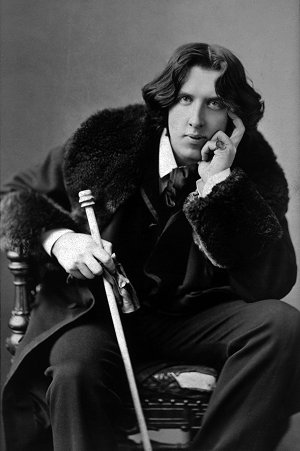
Oscar Wilde
(1854 – 1900)
Flower of Love
Sweet, I blame you not, for mine the fault was, had I not been made of common
clay
I had climbed the higher heights unclimbed yet, seen the fuller air, the
larger day.
From the wildness of my wasted passion I had struck a better, clearer song,
Lit some lighter light of freer freedom, battled with some Hydra-headed wrong.
Had my lips been smitten into music by the kisses that but made them bleed,
You had walked with Bice and the angels on that verdant and enamelled meed.
I had trod the road which Dante treading saw the suns of seven circles shine,
Ay! perchance had seen the heavens opening, as they opened to the Florentine.
And the mighty nations would have crowned me, who am crownless now and without name,
And some orient dawn had found me kneeling on the threshold of the House of Fame.
I had sat within that marble circle where the oldest bard is as the young,
And the pipe is ever dropping honey, and the lyre’s strings are ever strung.
Keats had lifted up his hymeneal curls from out the poppy-seeded wine,
With ambrosial mouth had kissed my forehead, clasped the hand of noble love in mine.
And at springtide, when the apple-blossoms brush the burnished bosom of the dove,
Two young lovers lying in an orchard would have read the story of our love;
Would have read the legend of my passion, known the bitter secret of my heart,
Kissed as we have kissed, but never parted as we two are fated now to part.
For the crimson flower of our life is eaten by the cankerworm of truth,
And no hand can gather up the fallen withered petals of the rose of youth.
Yet I am not sorry that I loved you -ah! what else had I a boy to do? –
For the hungry teeth of time devour, and the silent-footed years pursue.
Rudderless, we drift athwart a tempest, and when once the storm of youth is past,
Without lyre, without lute or chorus, Death the silent pilot comes at last.
And within the grave there is no pleasure, for the blindworm battens on the root,
And Desire shudders into ashes, and the tree of Passion bears no fruit.
Ah! what else had I to do but love you? God’s own mother was less dear to me,
And less dear the Cytheraean rising like an argent lily from the sea.
I have made my choice, have lived my poems, and, though youth is gone in wasted days,
I have found the lover’s crown of myrtle better than the poet’s crown of bays.
Oscar Wilde poetry
fleursdumal.nl magazine
More in: Archive W-X, Wilde, Oscar

William Butler Yeats
(1865-1939)
Two Songs Rewritten For The Tune’s Sake
I
My Paistin Finn is my sole desire,
And I am shrunken to skin and bone,
For all my heart has had for its hire
Is what I can whistle alone and alone.
Oro, oro.!
Tomorrow night I will break down the door.
What is the good of a man and he
Alone and alone, with a speckled shin?
I would that I drank with my love on my knee
Between two barrels at the inn.
Oro, oro.!
To-morrow night I will break down the door.
Alone and alone nine nights I lay
Between two bushes under the rain;
I thought to have whistled her down that
I whistled and whistled and whistled in vain.
Oro, oro!
To-morrow night I will break down the door.
II
I would that I were an old beggar
Rolling a blind pearl eye,
For he cannot see my lady
Go gallivanting by;
A dreary, dreepy beggar
Without a friend on the earth
But a thieving rascally cur —
O a beggar blind from his birth;
Or anything else but a rhymer
Without a thing in his head
But rhymes for a beautiful lady,
He rhyming alone in his bed.
William Butler Yeats poetry
fleursdumal.nl magazine
More in: Archive Y-Z, Yeats, William Butler
.jpg)
John Keats
(1795-1821)
Fancy
Ever let the Fancy roam,
Pleasure never is at home:
At a touch sweet Pleasure melteth,
Like to bubbles when rain pelteth;
Then let winged Fancy wander
Through the thought still spread beyond her:
Open wide the mind’s cage-door,
She’ll dart forth, and cloudward soar.
O sweet Fancy! let her loose;
Summer’s joys are spoilt by use,
And the enjoying of the Spring
Fades as does its blossoming;
Autumn’s red-lipp’d fruitage too,
Blushing through the mist and dew,
Cloys with tasting: What do then?
Sit thee by the ingle, when
The sear faggot blazes bright,
Spirit of a winter’s night;
When the soundless earth is muffled,
And the caked snow is shuffled
From the ploughboy’s heavy shoon;
When the Night doth meet the Noon
In a dark conspiracy
To banish Even from her sky.
Sit thee there, and send abroad,
With a mind self-overaw’d,
Fancy, high-commission’d:–send her!
She has vassals to attend her:
She will bring, in spite of frost,
Beauties that the earth hath lost;
She will bring thee, all together,
All delights of summer weather;
All the buds and bells of May,
From dewy sward or thorny spray;
All the heaped Autumn’s wealth,
With a still, mysterious stealth:
She will mix these pleasures up
Like three fit wines in a cup,
And thou shalt quaff it:–thou shalt hear
Distant harvest-carols clear;
Rustle of the reaped corn;
Sweet birds antheming the morn:
And, in the same moment, hark!
‘Tis the early April lark,
Or the rooks, with busy caw,
Foraging for sticks and straw.
Thou shalt, at one glance, behold
The daisy and the marigold;
White-plum’d lillies, and the first
Hedge-grown primrose that hath burst;
Shaded hyacinth, alway
Sapphire queen of the mid-May;
And every leaf, and every flower
Pearled with the self-same shower.
Thou shalt see the field-mouse peep
Meagre from its celled sleep;
And the snake all winter-thin
Cast on sunny bank its skin;
Freckled nest-eggs thou shalt see
Hatching in the hawthorn-tree,
When the hen-bird’s wing doth rest
Quiet on her mossy nest;
Then the hurry and alarm
When the bee-hive casts its swarm;
Acorns ripe down-pattering,
While the autumn breezes sing.
Oh, sweet Fancy! let her loose;
Every thing is spoilt by use:
Where’s the cheek that doth not fade,
Too much gaz’d at? Where’s the maid
Whose lip mature is ever new?
Where’s the eye, however blue,
Doth not weary? Where’s the face
One would meet in every place?
Where’s the voice, however soft,
One would hear so very oft?
At a touch sweet Pleasure melteth
Like to bubbles when rain pelteth.
Let, then, winged Fancy find
Thee a mistress to thy mind:
Dulcet-ey’d as Ceres’ daughter,
Ere the God of Torment taught her
How to frown and how to chide;
With a waist and with a side
White as Hebe’s, when her zone
Slipt its golden clasp, and down
Fell her kirtle to her feet,
While she held the goblet sweet
And Jove grew languid.–Break the mesh
Of the Fancy’s silken leash;
Quickly break her prison-string
And such joys as these she’ll bring.–
Let the winged Fancy roam,
Pleasure never is at home.
John Keats poetry
fleursdumal.nl magazine
More in: Archive K-L, John Keats, Keats, John
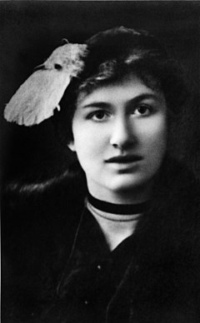
Edith Södergran
(1892-1923)
Le jour fraîchit…
I
Vers le soir, le jour fraîchit…
Bois la chaleur dans ma main,
Ma main et le printemps ont le même sang.
Prends ma main, prends mon bras blanc,
Prends le désir de mes grêles épaules…
Ce serait merveille de sentir
une seule nuit, une nuit comme celle-ci,
Ta tête lourde sur mon sein.
II
Tu jetas la rose rouge de ton amour
Sur mon sein —
l’étreins de mes mains brûlantes
la rose rouge de ton amour, qui bientôt flétrira…
O maître aux yeux glacés,
J’accepte la couronne que tu me tends,
qui me courbe la tête vers le cœur…
III
Je parle doucement aux arbres prisonniers,
J’ai vu mon seigneur pour la première fois ce jour.
Tremblante, je l’ai tout de suite reconnu.
Voici que je sens déjà sa main lourde sur mon bras léger…
Où est mon rire sonore de jeune fille,
ma liberté de femme portant haut la tête ?
Voici que je sens déjà son étreinte ferme sur mon corps frémissant,
Voici que j’entends l’éclat rude de la réalité
Sur mes frêles, frêles rêves.
IV
Tu cherchais une fleur
Et tu trouvas un fruit.
Tu cherchais une source
Et tu trouvas une mer.
Tu cherchais une femme
Et trouvas une âme —
Tu es déçu.
Edith Södergran poetry
fleursdumal magazine
More in: Archive S-T, Södergran, Edith
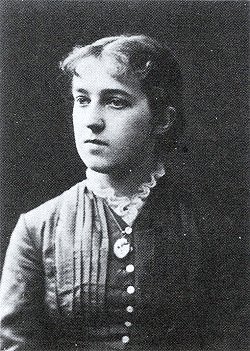
Hélène Swarth
(1859-1941)
Liefde
I
En langs een wand van rotsen, rug aan rug,
Volgde ik een pad verlicht door maan noch zon.
Toen stond ik vóór een afgrond en ik kon
Geen handbreed verder en geen stap terug.
En de angst des doods kwam over me, ik begon
Te beven en ik riep: – ‘Wie bouwt me een brug?’
En ‘t ver gebergte gaf mij, hoonend-stug,
Mijn woorden weêr, tot wanhoop mij verwon.
Toen zag ik naast me een marmerbleek gelaat,
Met donkere oogen, vonklende in den nacht,
En ‘k hoorde een stem, gebiedend, schoon zeer zacht:
‘Zoo ge om mijn hals vertrouwend de armen slaat,
Draag ík u over de’ afgrond!’ – Ik dan, als
Een kind, sloeg de armen, zwijgend, om zijn hals.
II
Ik hoorde ‘t ruischen van zijn vleugelslag
En anders niet. Toen vroeg ik: – ‘Wie zijt gij?
‘k Voel me aan uw borst zóó veilig en zóó blij,
Als hadde ik niet geleefd vóór dezen dag.’
Maar zwijgend vloog hij voort naar de andre zij
Van de’ afgrond, en ik weende om wat ik zag:
De weemoedswel, die in zijne oogen lag,
Vloeide over. – ‘Engel, is die traan voor mij?’
En na een wijle sprak hij: – ‘Ja, ik ween
Om wat ge in mijn naam lijden moest weleer,
En wéér moet lijden. Zie, hier blijft ge alleen.’
En in een woud liet hij met mij zich nêer,
Sloot met een kus mijne oogen en… vloog heen.
En ‘k zeeg ter aarde en hoorde en zag niet meer.
Hélène Swarth poetry
fleursdumal.nl magazine
More in: Archive S-T, Swarth, Hélène
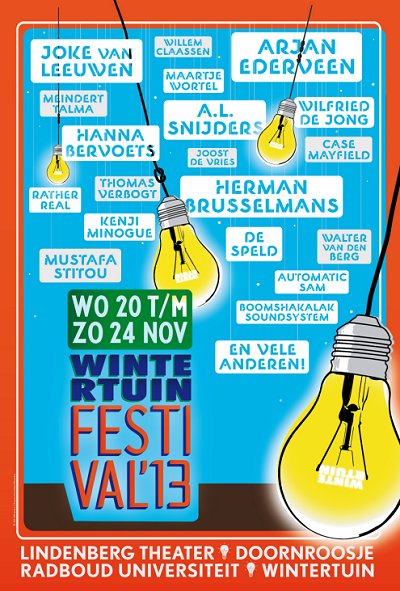
Wintertuinfestival in Nijmegen
Van 20 t/m 24 november 2013
Arjan Ederveen, Herman Brusselmans, A.L. Snijders, Wilfried de Jong, Joke van Leeuwen, Mustafa Stitou, Thomas Verbogt, Case Mayfield, De Speld, Meindert Talma, Automatic Sam en vele andere schrijvers, dichters, muzikanten, kunstenaars en wetenschappers treden op tijdens het Wintertuinfestival in Nijmegen. Van 20 t/m 24 november 2013 vindt het grootste literaire festival van Nederland plaats. Het thema is dit jaar ‘lichtheid in de literatuur’, naar een vermeend citaat van A.L. Snijders: “Het leven is al zwaar, laat de literatuur licht zijn”.
Op woensdagavond 20 november opent het festival met een bijzonder programma over het onnadrukkelijke maar sublieme oeuvre van de vorig jaar overleden schrijver Frans Kusters. Thomas Verbogt presenteert zijn boek Het eerste licht boven de stad, over zijn innige vriendschap met Kusters.
Op donderdag 21 november strijkt Wintertuin neer op de campus van de Radboud Universiteit Nijmegen. Volg een college van Herman Brusselmans, een masterclass over satire van De Speld en spraakmakende symposia.
Kom op vrijdag 22 november naar Doornroosje voor muziek, poëzie en eten. Een voedzame avond met onder anderen Joke van Leeuwen, Case Mayfield, Automatic Sam, de Bandeet Eetband en de presentatie van het allereerste backstagekookboek.
Op zaterdag 23 november pakt Wintertuin groots uit met een propvolle festivalavond in De Lindenberg. A.L. Snijders, de koning van de ZKV’s, gaat in gesprek met Maartje Wortel. Hilarische duizendpoot Arjan Ederveen legt in een interview met Wilfried de Jong zijn tv- en theatercarrière bloot. Mustafa Stitou draagt voor uit zijn nieuwste dichtbundel Tempel. Meindert Talma brengt zijn CD-in-boek Kelderkoorts ten gehore en Walter van den Berg en Joost de Vries, twee uitersten op de lijn werkelijkheid vs. verbeelding, spreken over de verschillen in hun auteurschap en werk.
Zondag 24 november staat in het teken van het leven op het platteland. In een matineeprogramma presenteert Wintertuin een nieuwe uitgave: de verhalenbundel van Willem Claassen over zijn coming of age tussen de koeien. Met optredens van o.a. Mustafa Stitou, Walter van den Berg en Meindert Talma en last but not least een cursus koeien melken.
# Website wintertuinfestival 2013
fleursdumal.nl magazine
More in: Art & Literature News, MUSIC, THEATRE, Wintertuin Festival

Amy Levy
(1861-1889)
Ballade of a Special Edition
He comes; I hear him up the street–
Bird of ill omen, flapping wide
The pinion of a printed sheet,
His hoarse note scares the eventide.
Of slaughter, theft, and suicide
He is the herald and the friend;
Now he vociferates with pride–
A double murder in Mile End!
A hanging to his soul is sweet;
His gloating fancy’s fain to bide
Where human-freighted vessels meet,
And misdirected trains collide.
With Shocking Accidents supplied,
He tramps the town from end to end.
How often have we heard it cried–
A double murder in Mile End.
War loves he; victory or defeat,
So there be loss on either side.
His tale of horrors incomplete,
Imagination’s aid is tried.
Since no distinguished man has died,
And since the Fates, relenting, send
No great catastrophe, he’s spied
This double murder in Mile End.
Fiend, get thee gone! no more repeat
Those sounds which do mine ears offend.
It is apocryphal, you cheat,
Your double murder in Mile End.
Amy Levy poetry
fleursdumal.nl magazine
More in: Amy Levy, Archive K-L, Levy, Amy
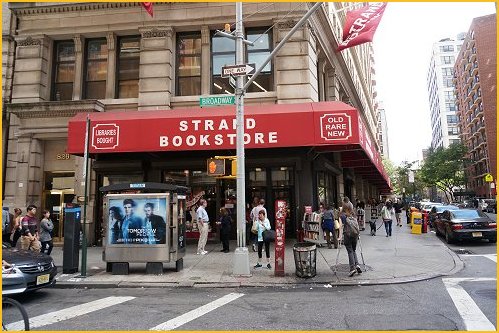
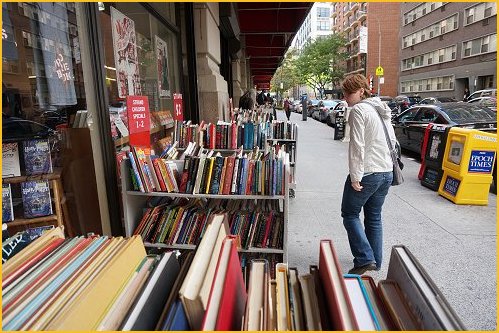
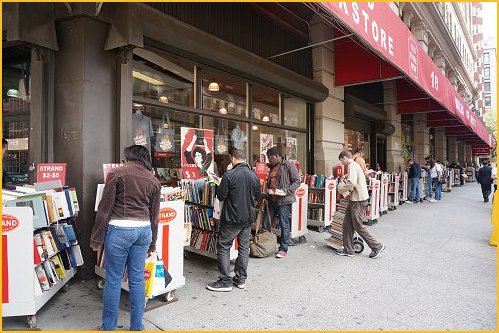
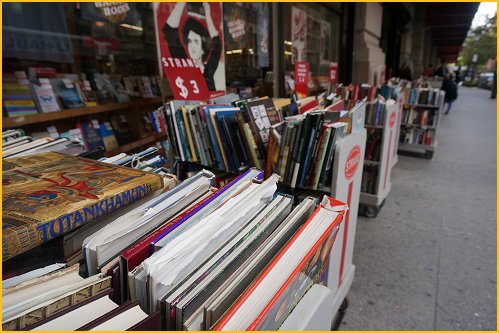
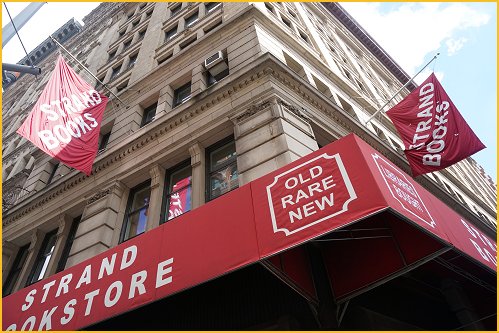
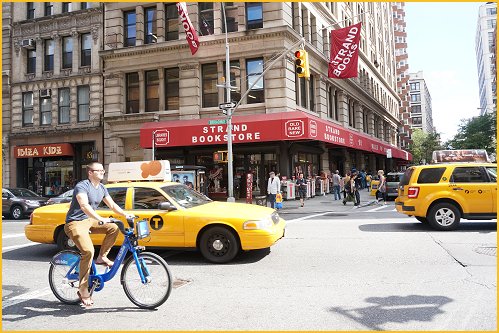
Strand Bookstore New York 2013
photos Hans Hermans
fleursdumal.nl magazine
More in: - Bookstores, FDM in New York, Hans Hermans Photos, Photography
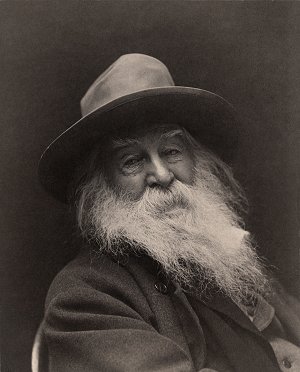
Walt Whitman
(1819–1892)
A Song
Come, I will make the continent indissoluble;
I will make the most splendid race the sun ever yet shone upon;
I will make divine magnetic lands,
With the love of comrades,
With the life-long love of comrades.
I will plant companionship thick as trees along all the rivers of
America, and along the shores of the great lakes, and all over
the prairies;
I will make inseparable cities, with their arms about each other’s
necks;
By the love of comrades,
By the manly love of comrades.
For you these, from me, O Democracy, to serve you, ma femme! 10
For you! for you, I am trilling these songs,
In the love of comrades,
In the high-towering love of comrades.
Walt Whitman poetry
fleursdumal.nl magazine
More in: Archive W-X, Whitman, Walt
.jpg)
Gabriele D’Annunzio
(1863-1938)
Lungo l’affrico
Grazia del ciel, come soavemente
ti miri ne la terra abbeverata,
anima fatta bella dal suo pianto!
O in mille e mille specchi sorridente
grazia, che da nuvola sei nata
come la voluttà nasce dal pianto,
musica nel mio canto
ota t’effondi, che non è fugace,
per me trasfigurata in alta pace
a chi l’ascolti.
Nascente Luna, in cielo esigua come
il sopracciglio de la giovinetta
e la midolla de la nova canna,
sì che il più lieve ramo ti nasconde
e l’occhio mio, se ti smarrisce, a pena
ti ritrova, pel sogno che l’appanna,
Luna, il rio che s’avvalla
senza parola erboso anche ti vide;
e per ogni fil d’erba ti sorride,
solo a te sola.
O nere e bianche rondini, tra notte
e alba, tra vespro e notte, o bianche e nere
ospiti lungo l’Affrico notturno!
Volan elle sì basso che la molle
erba sfioran coi petti, e dal piacere
il loro volo sembra fatto azzurro.
Sopra non ha sussurro
l’arbore grande, se ben trema sempre.
Non tesse il volo intorno a le mie tempie
fresche ghirlande?
E non promette ogni lor breve grido
un ben che forse il cuore ignora e forse
indovina se udendo ne trasale?
S’attardan quasi immemori del nido,
e sul margine dove son trascorse
par si prolunghi il fremito dell’ale.
Tutta la terra pare
argilla offerta all’opera d’amore,
un nunzio il grido, e il vespero che muore
un’alba certa.
![]()
Gabriele D’Annunzio poetry
fleursdumal.nl magazine
More in: Archive C-D, D'Annunzio, Gabriele
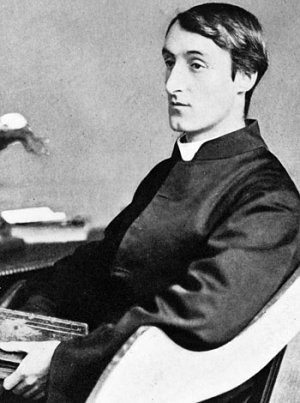
Gerard Manley Hopkins
(1844 – 1889)
The Alchemist in the City
My window shews the travelling clouds,
Leaves spent, new seasons, alter’d sky,
The making and the melting crowds:
The whole world passes; I stand by.
They do not waste their meted hours,
But men and masters plan and build:
I see the crowning of their towers,
And happy promises fulfill’d.
And I – perhaps if my intent
Could count on prediluvian age,
The labours I should then have spent
Might so attain their heritage,
But now before the pot can glow
With not to be discover’d gold,
At length the bellows shall not blow,
The furnace shall at last be cold.
Yet it is now too late to heal
The incapable and cumbrous shame
Which makes me when with men I deal
More powerless than the blind or lame.
No, I should love the city less
Even than this my thankless lore;
But I desire the wilderness
Or weeded landslips of the shore.
I walk my breezy belvedere
To watch the low or levant sun,
I see the city pigeons veer,
I mark the tower swallows run
Between the tower-top and the ground
Below me in the bearing air;
Then find in the horizon-round
One spot and hunger to be there.
And then I hate the most that lore
That holds no promise of success;
Then sweetest seems the houseless shore,
Then free and kind the wilderness,
Or ancient mounds that cover bones,
Or rocks where rockdoves do repair
And trees of terebinth and stones
And silence and a gulf of air.
There on a long and squared height
After the sunset I would lie,
And pierce the yellow waxen light
With free long looking, ere I die.
Gerard Manley Hopkins poetry
fleursdumal.nl magazine
More in: Archive G-H, Hopkins, Gerard Manley
.jpg)
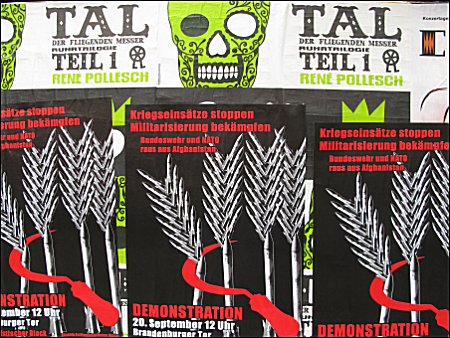
.jpg)
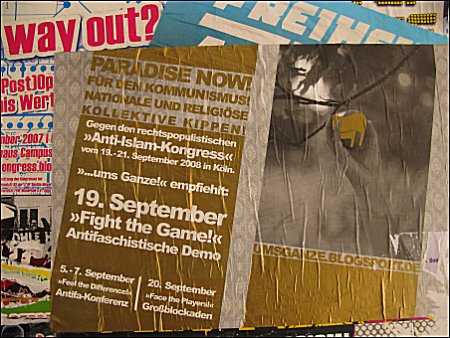
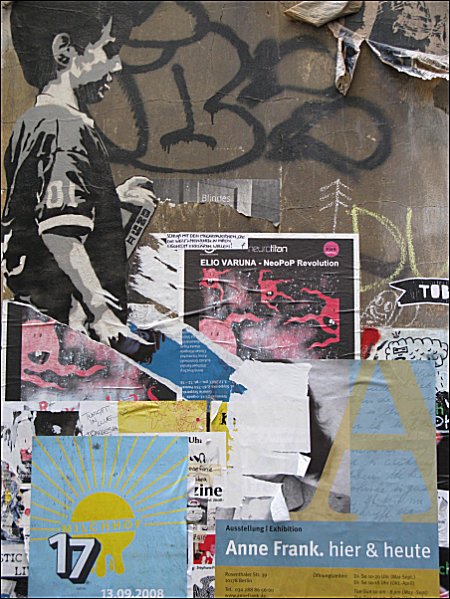
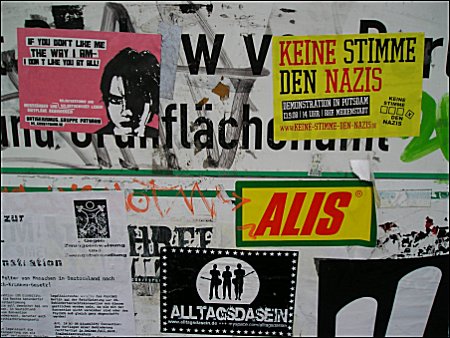

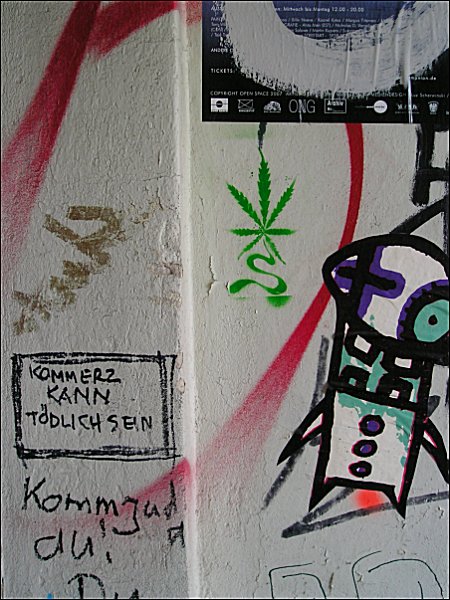
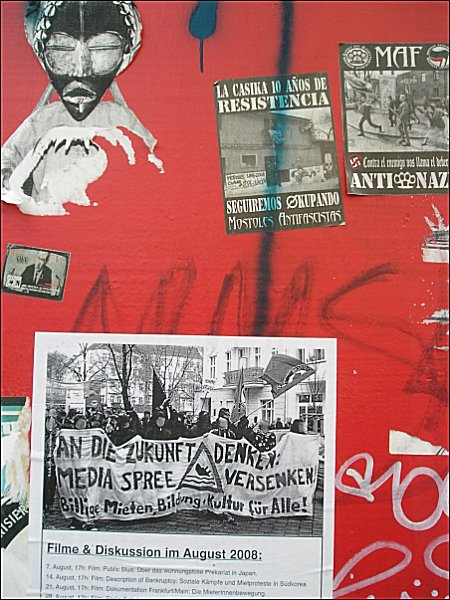
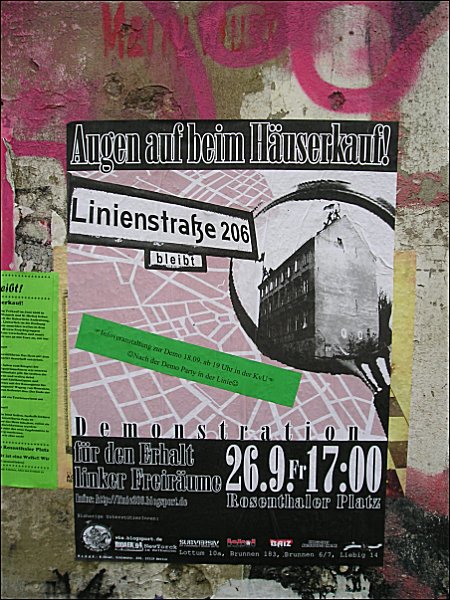
Nachrichten aus Berlin
Unser Korrespondent Anton K. berichtet:
Berliner Plakate IV: Protest
Photos Anton K.
fleursdumal.nl magazine
More in: Anton K. Photos & Observations, FDM in Berlin, MUSEUM OF PUBLIC PROTEST, Nachrichten aus Berlin
Thank you for reading Fleurs du Mal - magazine for art & literature